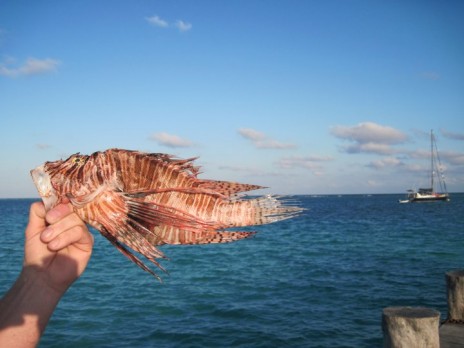Traditional Fisheries Shark Tank Update – Shark Tank Season 4
Gary Groomes and Dave Johnson Pitch Traditional Fisheries, a Business Focused on Harvesting and Selling Lionfish for Human Consumption, on Shark Tank.

Highlights
- Gary Groomes and Dave Johnson seek $225,000 for 25% equity in Traditional Fisheries, a business aimed at controlling the invasive lionfish population by turning it into a marketable seafood dish.
- The Sharks express concerns about the challenges of consumer education, the high cost of harvesting lionfish, and market demand, leading to no deal.
- Without a Shark investment, Traditional Fisheries goes out of business shortly after the episode airs, though lionfish filets are now sold in stores like Publix and Whole Foods.
Overview
| Category | Details |
|---|---|
| Name | Traditional Fisheries |
| Founders | Gary Groomes, Dave Johnson |
| Industry | Sustainable Seafood & Environmental Conservation |
| Product | Lionfish harvesting for human consumption |
| Funding Sought | $225,000 |
| Investment Ask | $225,000 |
| Equity Offered | 25% |
| Valuation | $900,000 |
Traditional Fisheries swims in the Shark Tank in episode 419. Entrepreneurs Gary Groomes and Dave Johnson have made it their business to help eradicate the invasive Lionfish species from the Caribbean Sea and coastal Florida. The Lionfish is native to the Pacific Ocean – primarily in Indonesia; it’s also a popular aquarium fish. Lionfish first popped up in coastal Florida in the 1990’s and it is speculated they came into this foreign habitat via careless aquairiasts who discarded them into the ocean.
The Lionfish is venomous and has no natural predators in the southern USA and Caribbean Waters. This led to an increase in their population and a negative impact on many native species like grouper and snapper. They also contribute to the destruction of coral reefs as they feed on organisms that sustain the reefs. While the Lionfish may never be completely eradicated in its new habitat, the Traditional Fisheries guys have a way to control them as natural as the clear, blue waters themselves: they catch them and cook them. Catching Lionfish and selling them for human consumption is their business and they hope the Sharks will want to dine on Lionfish with them.
Traditional Fisheries Shark Tank Recap
Gary Groomes and Dave Johnson are looking for $225,000 in return for 25% of the company. They present the lionfish as an “environmental terrorist,” explaining that since its accidental introduction 20 years ago, it has become the second most common species in the Atlantic and Caribbean oceans. With no natural predators and a voracious appetite for commercial species like snapper, lionfish pose a real threat to the ecological balance. Groomes and Johnson propose to repair the damage by turning lionfish into a delectable dish.
Daymond John wants to know how the fish, which live in caves in reefs, can be caught on a large enough scale to sell commercially. Groomes explains that the fish must be speared. The pair have contracted with spearfishermen to provide their catch. The business has cleared $12,000 in the past year.
Who’s In?
Robert Herjavec believes that the biggest obstacle to the business will be educating the consumer about the new fish dish. “I don’t care how much supply you have, if there’s no demand,” he says, and goes out.
Kevin O’Leary refers to the history of lobster, saying it took 40 years to go from being considered “the cockroach of the sea” to a delicacy. He believes it will take too long for lionfish to gain a place in the market. He’s out.
Daymond John says that the “educational challenge” will cost more than $225,000 to solve. He’s out. Mark Cuban agrees. He’s out.
Lori Greiner loves anything that helps the economy, but “can’t see people running to eat lionfish.” The final Shark goes out, and the pair leave the stage without a Shark deal.
Traditional Fisheries Shark Tank Update
It seems that the spiny problem of consumer education was too large a deterrent for the Sharks. The market for lionfish would have to be built from the ocean floor up. The cost of marketing and creating a niche in the market, when the product is so difficult to procure, is simply too high.
Without a Shark investment, Traditional Fisheries was not able to move forward in their mission to rid the Atlantic and Carribean of the invasive lionfish. Their website no longer exists, and social media pages have not been updated since 2011. We can only hope that others will rise to the battle against invasive species, to take the place of Traditional Fisheries which has sunk beneath the waves.
Traditional Fisheries Shark Tank Update
This company went out of business a few months after their episode aired. Perhaps they were ahead of their time. As of July, 2021, Lionfish filets are available in Publix and Whole Foods and from dozens of online suppliers.
Posts About Traditional Fisheries on Shark Tank Blog
Company Information













I saw you on Shsark Tank…Sorry you didn’t get and one to help you… Florida Fish and Wildlife are giving a T shirt to anyone who submits a picture with a Lion Fish..
check out the Florida Fish ANd Wildlife conservation Commission. Tell then about the good taste of the lion fish…It might lmake a differfence… GOOD LUCK..
Whole Foods is selling lionfish now : http://www.sun-sentinel.com/features/deals-shopping/sfl-whole-foods-market-to-sell-invasive-lionfish-starting-wednesday-20160524-story.html
I advise you to set up an incentive for people to spear these fish for recreation. If you can put a
secret tattoo or mark on a few of these fish and then offer a large money prize to whoever spears a fish
with the marking you may find that it could become a really popular sport or hobby. It could be like
the movie Charlie And The Chocolate Factory where everyone was buying as many chocolate bars as they could so that they could find the golden ticket and win a prize. I really think this idea could work
if the prize money was motivating and you do a good job marketing the idea.
The Florida Wildlife Commission has prizes for the most lionfish caught per year
You don’t need teach people how good is lion fish, I can buy as many lion fish as you can catch. It will save you $225,000 for the Advertisement. Please contact me for the business.